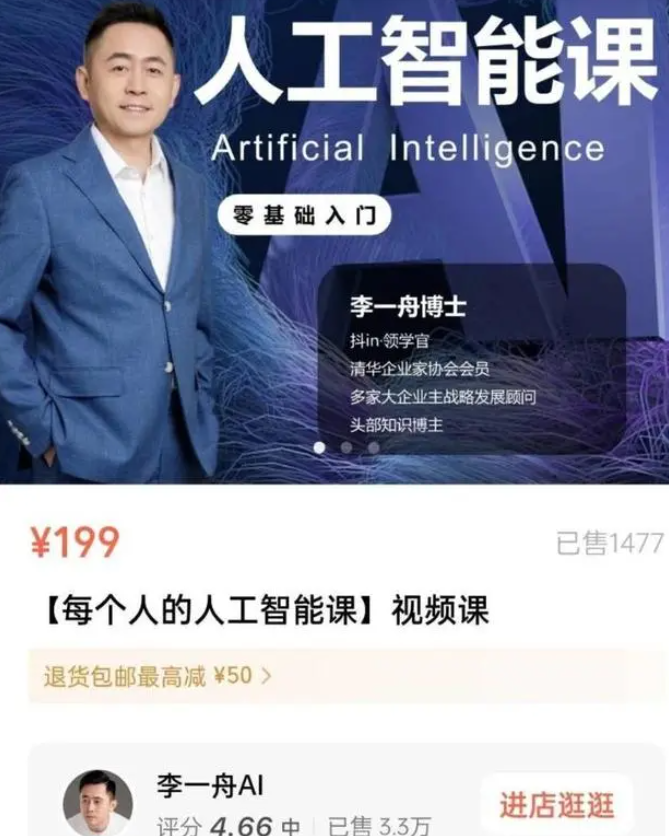Chinese Netizens Compare AI Development Between China and the US: While the US Advances in Technology, Tsinghua PhD Li Yizhou Sells AI Online Courses, Making 50 Million Yuan from a 199 Yuan Course
Recently, Li Yizhou became a hot search topic for making 50 million yuan in one year from his AI course priced at 199 yuan.
Li, hailing from Changsha, Hunan, holds a PhD from Tsinghua University, specializing in Industrial Design and Design Innovation Methods, and the Institute of Design Strategy and Prototype Innovation. The entrepreneurial field of AI large models in China is crowded with talents from Tsinghua, making Li’s 199 yuan AI course highly sought after.

However, the “Science and Technology Innovation Board Daily” reporter found that Li actually graduated from the Tsinghua Academy of Fine Arts, unrelated to AI or deep learning fields. A 2013 report on Tsinghua University’s official website shows that Li was a student at the Academy of Fine Arts, in his fifth year of doctoral studies at the time.
On February 21, the “Science and Technology Innovation Board Daily” sent an interview request through Li’s Douyin video account but received no response by the time of publication. A Financial Advisor (FA) mentioned to the reporter that Li is not currently seeking financing, hence the lack of contact. Despite obtaining Li’s contact information and calling, there was no answer.
Tsinghua PhD Sells AI Course
Following the popularity of ChatGPT, it appears that “water sellers” are the first to strike gold.
Feigua Data shows that Li’s AI course “AI for Everyone” sold about 250,000 sets within a year, generating approximately 50 million yuan. The original price of the course was 999 yuan, now discounted to 199 yuan.
On Douyin, Li has already amassed a significant following. As a financial self-media personality, his signature reads: “Tsinghua University PhD, founder of three technology companies, financed tens of millions, professional manager, skilled in AI artificial intelligence, business models, knowledge IP, and traffic issues.”
From a Tsinghua University PhD to the founder of three tech companies, and a manager who has raised tens of millions, each “title” adds to the appeal of Li’s AI course.

Industry insiders interviewed by the reporter believe that the success in selling courses stems from the virtual nature of knowledge payment. “Each successful toC sale actually captures the customer’s fear or desire, or a combination of both.”
However, according to Bu Rixin, selling courses is not as easy as imagined. Ordinary bloggers without a large follower base may not attract many paying users even with extensive promotion, making it more cost-effective to give a one or two-hour talk on a third-party platform.
On third-party video platforms, each of Li’s videos garners thousands or even tens of thousands of likes. The content on “AI Business Opportunities” received 6093 likes.
How can ordinary people make money through AI? Li sees three paths: AI-driven content creation for e-commerce, B2B services after learning model tuning and prompt engineering, and multi-platform account management using AI for graphics and advanced video production, exploiting a 3-6 month traffic boom for precise gains.
In essence, Li believes that everyone needs to learn AI due to its unmatched efficiency in work.
Before Selling Courses: Li’s Entrepreneurial Ventures
Before selling courses, Li often discussed his experiences with entrepreneurship, investment, and employment.
Indeed, Li has ventured into entrepreneurship three times. Tsinghua University’s official website shows his projects included the “Magic Mirror” APP, “Weimi” APP, and 12sleep Keyi Technology.
“Magic Mirror” allowed users to command the mirror with sound waves to function as a “camera,” while “Weimi” used human skin as a conductor to recommend skincare products based on skin moisture levels measured through the phone screen.
12sleep Keyi Technology represents Li’s genuine entrepreneurial effort. The company has completed three rounds of financing, attracting attention from Lei Jun by entering the Xiaomi ecosystem.
As of now, 12sleep Keyi Technology is still operational, with Li as the controlling shareholder. Another company he managed, Beijing Yige Technology Co., Ltd., is held by Beijing Yuemi Technology Co., Ltd., with Shan Shi Capital also holding a stake.
It’s noteworthy that Shan Shi Capital has invested in Sleep Interest Technology. Li mentioned that after the acquisition of his startup, he served as vice president, overseeing product and supply chain, contributing to a Xiaomi ecosystem company’s annual sales exceeding 1 billion yuan within a year and a half.
AI Course Group Suspected to Be Disbanded
From a Tsinghua PhD to “acquired startup,” Li’s early career was smooth. However, the recent buzz about his “199 yuan AI course making 50 million yuan” has brought him under the spotlight. Yet, doubts have arisen as his AI course group appears to have been disbanded. A screenshot showed that messages could no longer be sent in the disbanded “Li Yizhou AI Artificial Intelligence Practical Training Camp B,” leading some netizens to label Li’s AI course a scam.
Portions of Li’s AI course content, available on Bilibili, seem to cover basic concepts and introductions to large models, AI, and ChatGPT.
Strictly speaking, Li, a graduate of Tsinghua’s Academy of Fine Arts, is an outsider to AI technical knowledge. However, his core topics include design and user experience, AIoT, entrepreneurial insights, and side business implementation.
Bu Rixin, General Manager of Chuangdao Investment Consulting, views AI courses as capitalizing on consumer ignorance, exploiting their anxiety about the future and desire for new knowledge.
“Course sales success partly relies on narratives around ‘entrepreneurial hardship and financing logic,’ with some promising ‘fundraising success in half a month after completing the course.’ The difference between knowledge and emotional appeal likely drives course popularity. Generally, learning is demanding, and few are willing to pay to be burdened. However, claims that ‘attending an AI course keeps you current and prevents obsolescence’ tap into modern anxieties,” Bu said.
Li also stated on video platforms that regardless of making money through AI, staying current is essential to secure one’s livelihood.
This incident highlights unhealthy aspects in China’s tech research environment, where many highly educated individuals prioritize quick profits over genuine research and development.